
Finding the perfect plush toy manufacturer for your custom project can be daunting. With so many factors to consider, from design capabilities and certifications to communication and production capacity, it’s essential to know what questions to ask when selecting the right partner. In this Q&A-style blog post, we will address some of the most crucial questions to help you navigate the process and find a plush toy manufacturer that exceeds your expectations. Let’s dive in and discover what you need to know to make the best decision for your custom plush toy project.
What key factors will be considered when choosing a plush toy manufacturer?

When selecting a plush toy manufacturer, it’s essential to consider their design capabilities, experience, certifications, production capacity, and communication. Select a manufacturer with a demonstrated history of producing custom stuffed toys that are safe, compliant, and high-quality. Additionally, prioritize a manufacturer with excellent communication skills, as this ensures a smooth collaboration throughout the project. By focusing on these critical factors, you’ll find a reliable partner to bring your custom stuffed toy ideas to life while meeting your specific requirements and standards.
Now that we’ve highlighted the essential factors to consider when choosing a plush toy manufacturer let’s dive deeper into each aspect. In the following sections, we will discuss these factors in more detail to provide a comprehensive understanding of what to look for in an ideal manufacturer.
What aspects should I take into account when assessing a stuffed toys manufacturer?
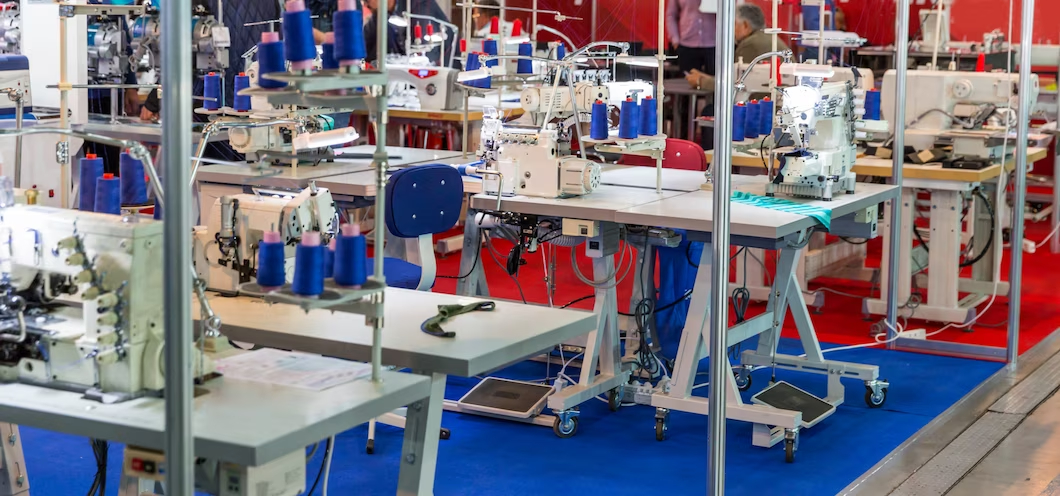
Several crucial factors must be considered when evaluating a stuffed toy manufacturer to guarantee that you are partnering with a reliable, high-quality manufacturer. These factors include:
1. Reputation:
Research the manufacturer’s reputation within and among their clients. Look for testimonials, reviews, and case studies to get a sense of their reliability and the quality of their work.
2. Material sourcing:
Investigate how the manufacturer sources their materials, ensuring they use high-quality, safe, eco-friendly materials. This is particularly important for plush toys, as children often use them.
3. Manufacturing facilities:
Understanding the working conditions and environment of the manufacturer’s facilities is essential. It can provide insights into their commitment to ethical practices and quality control.
4. In-house capabilities:
Consider the manufacturer’s range of services, including design, prototyping, production, and quality control. Ideally, the manufacturer should have in-house capabilities to handle all aspects of stuffed toy production, ensuring better communication and consistency throughout the process.
5. Pricing and payment terms:
Evaluate the manufacturer’s pricing structure and payment terms, ensuring they align with your budget and financial expectations. Transparent pricing and flexible payment terms can help to build trust and foster a long-term working relationship.
6. Intellectual property protection:
Assess the manufacturer’s commitment to protecting your intellectual property rights. They should have measures to safeguard your designs and prevent unauthorized reproduction or distribution.
7. Sample development:
A reputable manufacturer should be able to provide high-quality samples of their work, allowing you to evaluate their craftsmanship, attention to detail, and adherence to your design specifications. This is a critical step in determining whether the manufacturer can deliver the quality you expect for your plush toys.
8. Environmental and social responsibility:
Evaluate the manufacturer’s commitment to sustainable and ethical practices, such as reducing waste, using eco-friendly materials, and ensuring fair labor conditions for their employees. Partnering with a socially responsible manufacturer reflects positively on your brand and contributes to a better world.
9. Scalability:
Consider whether the manufacturer can scale their production capabilities to meet your growing needs as your business expands. A manufacturer with the capacity to grow with you can be an invaluable long-term partner.
10. Location and logistics:
The manufacturer’s location can impact shipping times and costs. Consider whether the manufacturer’s proximity to your target market and ability to manage logistics align with your business goals efficiently.
Considering these factors when evaluating stuffed toys manufacturer can help you select a reliable, high-quality partner that aligns with your business objectives and values.
How can I verify a manufacturer’s certifications and compliance with industry standards?
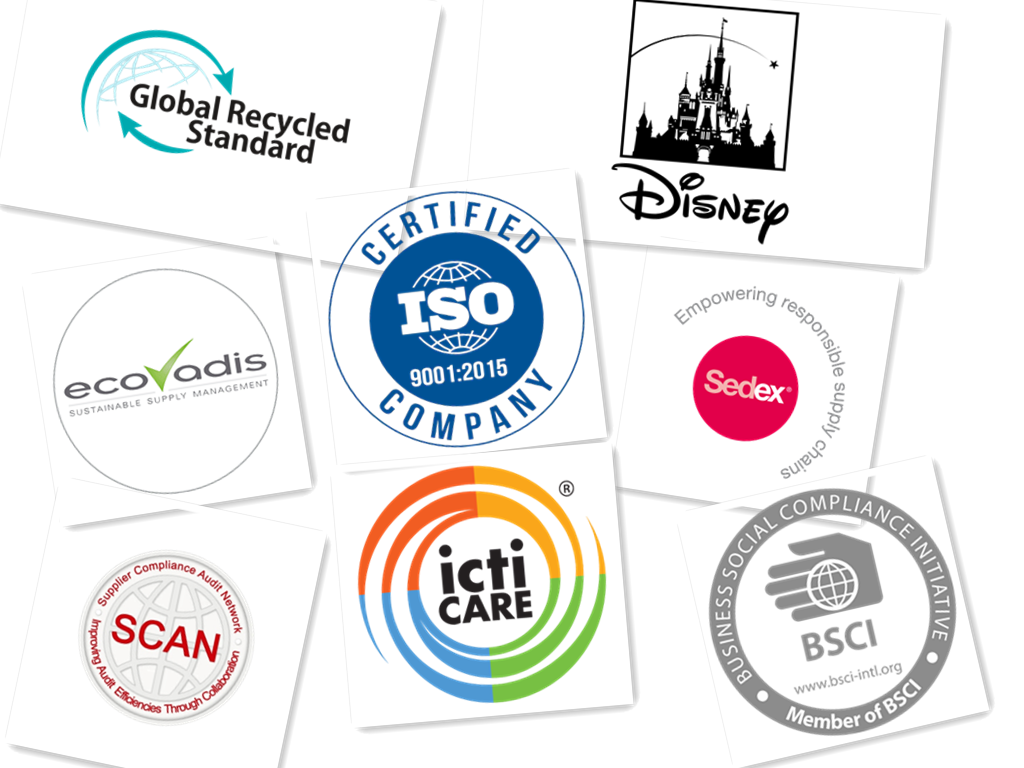
To verify a plush manufacturer’s certifications and be compliant with industry standards, there are a few steps you can take:
Check the manufacturer’s website: Many manufacturers will display their certifications and compliance standards. Look for logos or information about reputable organizations such as ASTM International, the International Organization for Standardization (ISO), the Consumer Product Safety Commission (CPSC), and EN71(a kind of safety testing for EU market).
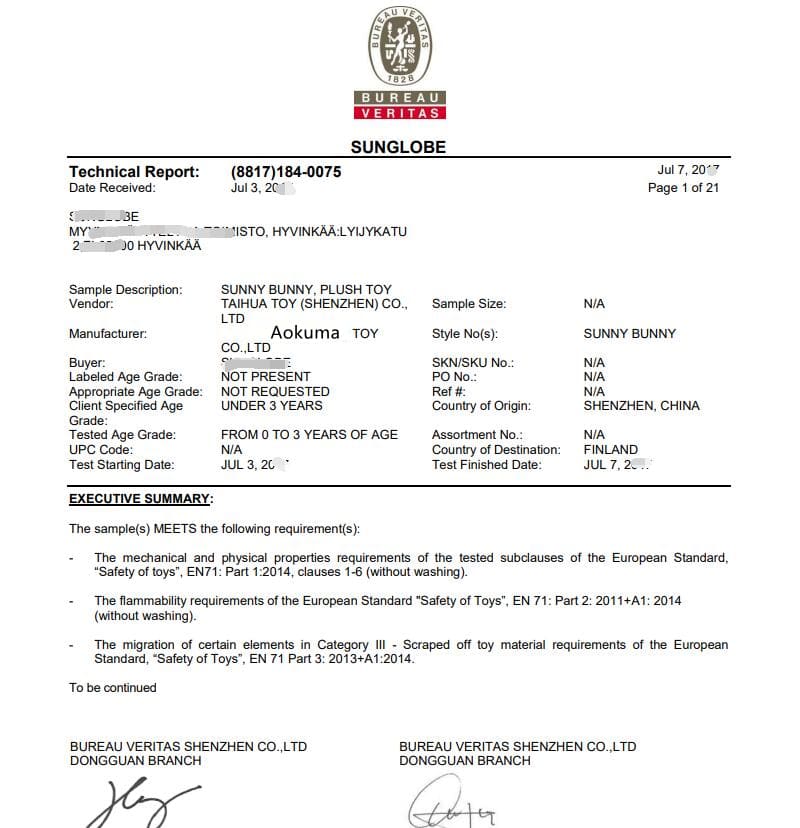
1. Contact the custom plush toy manufacturer:
You can contact the manufacturer directly and ask about their certifications and compliance with industry standards. A reputable manufacturer will be transparent and provide you with the necessary information.
2. Check with third-party organizations:
Several organizations provide certifications and audits for manufacturers. You can check with these organizations to see if the manufacturer you are considering has been certified or audited. Some examples include:
International Council of Toy Industries (ICTI): The ICTI is a non-profit organization that sets safety and ethical standards for the toy industry. The ICTI certification program ensures that factories producing toys meet these standards. You can check if a manufacturer is ICTI certified on the ICTI website: https://toy-icti.org.
Business Social Compliance Initiative (BSCI): The BSCI is a European initiative that promotes ethical and social standards in the supply chain. BSCI conducts audits to ensure that factories meet these standards. You can check if BSCI audits a manufacturer on the BSCI database: https://www.bscicompany.org
Sedex: Sedex is a global membership organization providing businesses with a platform to manage and share ethical and responsible supply chain data. Sedex members can share audits, assessments, and other information to demonstrate compliance with ethical and social standards. You can check if a manufacturer is a Sedex member on the Sedex website: https://www.sedex.com/.
3. Check with regulatory agencies:
Depending on the country where the manufacturer locates, regulatory agencies may oversee the production of stuffed toys. For example, CPSC(the Consumer Product Safety Commission) sets toy safety in the United States. You can check with these agencies to see if the manufacturer complies with their regulations.
By taking these steps, you can verify that a plush manufacturer is certified and complies with industry standards. It can give you peace of mind when purchasing stuffed toys for yourself or as gifts for others.
What should I look for regarding a plush toys manufacturer’s design and customization capabilities?

When choosing a stuffed toy manufacturer, it is vital to consider their design and customization capabilities. Here are some factors to look for:
1. Experience and expertise:
Look for a manufacturer with experience and expertise in designing and manufacturing stuffed toys. Ask about their design process and whether they get a team of experienced designers who can help you create custom designs.
2. Customization options:
Consider what customization options the manufacturer offers. Can they create stuffed toys in different sizes, colors, and shapes? Can they add custom features such as embroidered logos or special packaging?
3. Quality of materials:
Look for a manufacturer that uses exceptional quality materials to create stuffed toys. The materials used can affect the overall look and feel of the toy and its durability.
4. Safety standards:
Ensure the manufacturer follows safety standards and regulations for stuffed toys. The toy should be made with non-toxic materials and meet safety standards set by organizations like the Consumer Product Safety Commission (CPSC).
5. Communication and collaboration:
Choose a manufacturer that values communication and collaboration. The manufacturer should be willing to work with you throughout the design and manufacturing process, providing regular updates and seeking your input and feedback.
6. Turnaround time:
Consider the manufacturer’s turnaround time for creating custom plush toys. Make sure their production timeline aligns with your project timeline and deadlines.
By choosing a custom plush toys manufacturer with solid design and customization capabilities, you can create unique, high-quality plush toys that meet your needs and requirements. By considering these factors, you can ensure that the manufacturer you choose is capable of delivering the results you are looking for.
How important are communication and customer service when working with a stuffed toy manufacturer?

Communication and customer service are essential when working with a plush toy manufacturer. Here’s why:
1. Collaboration:
Good communication and customer service allow for effective collaboration between you and the manufacturer. This collaboration is vital in designing and producing the plush toys, ensuring that your vision for the product is accurately translated into the final product.
2. Timely feedback:
A good manufacturer will provide timely feedback and updates throughout the manufacturing process, including design, production, and delivery updates. This allows you to make any necessary changes or adjustments early in the process, saving time and money in the long run.
3. Flexibility:
Effective communication and customer service allow for greater flexibility in the design and production process. You can work with the manufacturer to make adjustments without delaying the production timeline if changes are needed.
4. Trust:
Good communication and customer service build trust between you and the manufacturer. This trust is essential when working on a project where quality and attention to detail are crucial. With confidence, you can be confident that the manufacturer will deliver a high-quality product that meets your standards.
5. Customer satisfaction:
Good communication and customer service ultimately lead to greater customer satisfaction. When you feel heard, valued, and supported throughout the manufacturing process, you are more likely to be satisfied with the final product.
Communication and customer service are critical when working with a plush toy manufacturer. They allow for effective collaboration, timely feedback, flexibility, trust, and greater customer satisfaction. When choosing a manufacturer, consider their communication and customer service policies and practices to ensure a positive experience.
What should I know about a manufacturer’s production capacity and lead times?
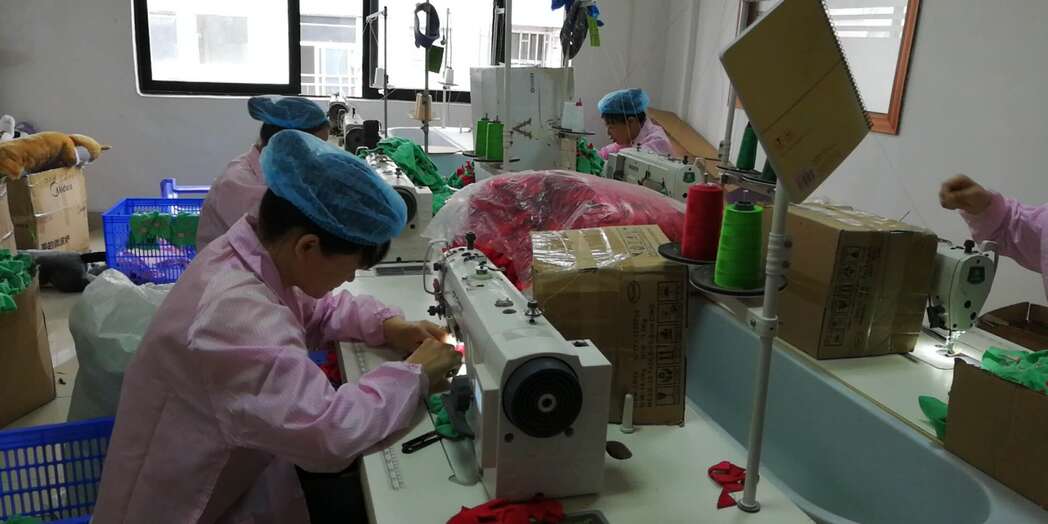
When choosing a plush toy manufacturer, it’s essential to consider their production capacity and lead times. Here are some key points to remember:
1. Production capacity:
Find out how many plush toys the manufacturer can produce in a given period. This will help you determine if they can handle your project, especially if you need many plush toys.
2. Lead times:
Ask about the manufacturer’s lead times and how long it takes them to complete a project from start to finish. This includes the time it takes to produce the plush toys and any time needed for shipping or delivery.
3. Flexibility:
Find out if the manufacturer can accommodate their lead times. For example, can they rush an order or adjust the production schedule to meet your needs?
4. Quality control:
Ensure the manufacturer has a robust quality control process to ensure the plush toys meet your specifications and standards.
5. Communication:
It’s essential to communicate clearly with the manufacturer throughout the production process, including updates on progress, timelines, and any potential delays or issues.
6. Location:
Consider the manufacturer’s site concerning your area or the location of your customers. This can affect shipping times and costs.
7. Price:
Finally, consider the cost of the plush toys about the production capacity and lead times. While you don’t want to sacrifice quality for a lower price, you also want to avoid overpaying for a product that doesn’t meet your needs.
Considering these factors, you could choose a plush toy manufacturer with the production capacity and lead times that meet your needs while ensuring quality and clear communication throughout the production process.
How can I assess the quality of a manufacturer’s previous work?
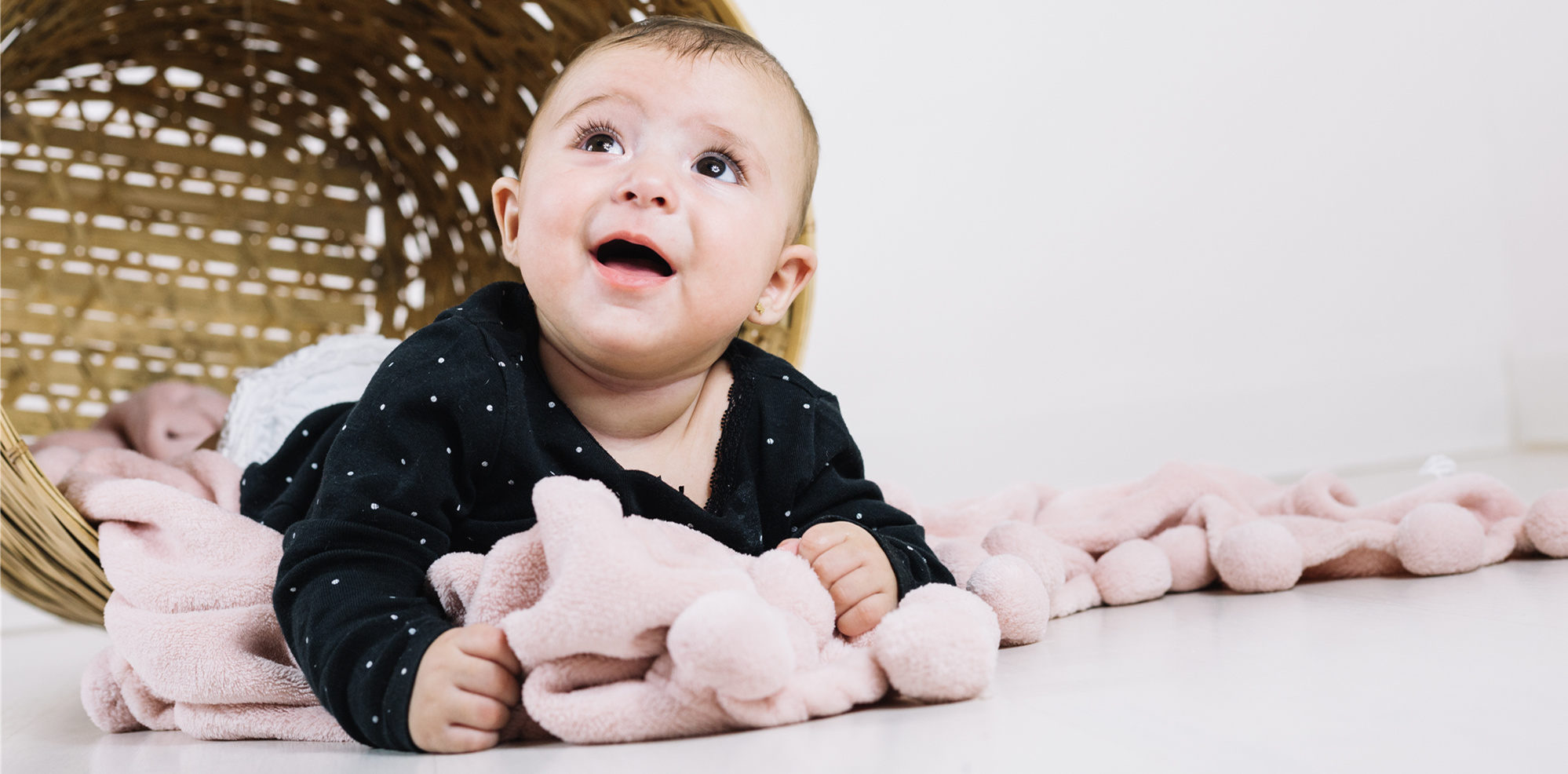
Assessing the quality of a manufacturer’s previous work is essential in choosing a plush toy manufacturer. Here are some ways to evaluate the quality of their work:
1. Samples:
Request samples of the manufacturer’s previous work. This will allow you to see and feel the quality of their products firsthand. Look for consistency in the stitching, the quality of the materials used, and the overall design and construction of the plush toys.
2. Reviews:
Look for reviews from other customers who have worked with the manufacturer. This can give you an idea of their experience with the manufacturer, including the quality of the products and the level of customer service.
3. References:
Ask the manufacturer for references from other customers who have worked with them. Reach out to these references and ask about their experience with the manufacturer, including the quality of their work and their level of communication and customer service.
4. Industry certifications:
Look for industry certifications or accreditations that the manufacturer holds. These indicate that an independent third party has evaluated and approved the manufacturer for quality, safety, and ethical practices.
5. Online presence:
Check the manufacturer’s website and social media accounts for photos and information about their previous work. This can give you a sense of their style, design capabilities, and overall quality.
6. Visit the factory:
Visit the manufacturer’s factory and see their production process firsthand. This can help you better understand the manufacturer’s quality control processes and overall quality commitment.
Using these methods to assess the quality of a manufacturer’s previous work, you can make an informed decision when choosing a plush toy manufacturer that meets your needs and standards.
What questions should I ask a potential plush toy manufacturer during selection?

When selecting a plush toy manufacturer, asking the right questions is essential to ensure they meet your needs and expectations. Here are some questions to consider:
What is your experience in the plush toy industry?
Can you provide examples of your previous work, including photos and samples?
What customization options do you offer?
What is your production capacity, and can you handle the number of plush toys I need?
What is your typical lead time for production and delivery?
What quality control processes do you have in place?
Do you follow industry standards for safety and ethical manufacturing practices?
What is your pricing structure?
What is your policy for revisions or changes during the production process?
What is your policy for shipping and delivery, and can you provide tracking information?
How do you handle customer service and communication during the production process?
Do you have a minimum order quantity or value?
What is your policy for handling returns or exchanges?
You can better understand the manufacturer’s experience, capabilities, and policies by asking these questions. This can help you make an informed decision when choosing a plush toy manufacturer that meets your needs and standards.
In summary, selecting the proper plush toy manufacturer ensures your products’ quality, safety, and customization. When deciding, it is essential to consider several factors, such as the manufacturer’s experience, certifications, design capabilities, communication, and production capacity. You can be assured of high-quality products that meet your specifications and standards by selecting a manufacturer. The Q&A guide can help readers make informed decisions by asking the right questions and considering all relevant factors when choosing a manufacturer for their custom plush toy needs.

One Response